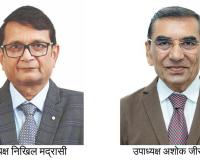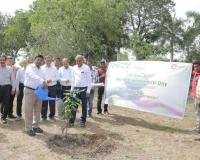Implementation of Technical Regulation on Textile Machinery Deferred by One Year; SGCCI Welcomes Relief for Surat’s Industry

Surat – The Ministry of Heavy Industries, Government of India, has officially deferred the implementation of the Omnibus Technical Regulation (OTR) order on textile weaving and embroidery machinery by one year. Initially scheduled to take effect from August 28, 2025, the enforcement of the regulation has now been postponed to September 1, 2026. The South Gujarat Chamber of Commerce and Industry (SGCCI) has welcomed this move and expressed gratitude to the central government.
SGCCI President Nikhil Madrasi stated that the decision has brought significant relief to the textile industry in South Gujarat. He noted that the extended timeline will encourage the domestic production of high-quality weaving and embroidery machinery, thereby giving a much-needed boost to the "Make in India" initiative.
Recently, a delegation comprising SGCCI Vice President Ashok Jirawala, former President Ashish Gujarati, and other industry representatives met Union Heavy Industries Minister H.D. Kumaraswamy, Joint Secretary Vijay Mittal, Director Vikas Dogra, and Textile Secretary Neelam Shami Rao in New Delhi to request the deferment of the OTR order. Former SGCCI President Vijay Mevawala also submitted multiple representations to the central authorities on the issue.
The delegation informed the Centre that Surat is India’s largest man-made fabric (MMF) textile hub, importing between 2,500 and 4,000 high-speed weaving and embroidery machines annually. However, domestic manufacturing of such advanced machinery is currently limited. With ongoing investments in waterjet weaving, airjet, and rapier technologies, the premature enforcement of mandatory quality control orders could have posed serious challenges to the industry.
SGCCI emphasized that the extension now gives the sector much-needed preparation time, enabling Indian manufacturers to develop machines that match the quality of imported equipment. This decision is seen not only as a direct support to the industry but also as a significant step toward national self-reliance in advanced textile machinery production.






